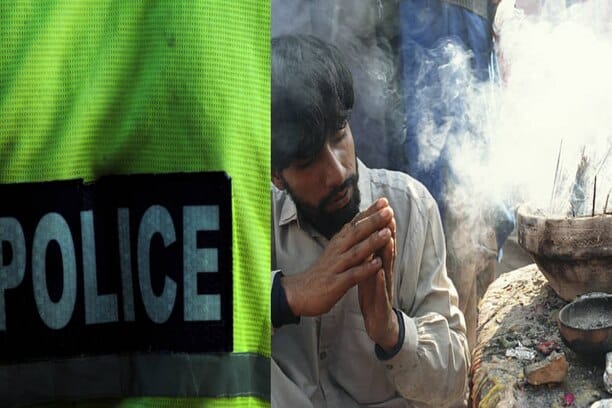

New Delhi – (EPICSTORIAN) – The Indian police have, under Gujarat’s newly enacted law against black magic and superstitious practices, arrested a 29-year-old man for allegedly performing rituals at a crematorium and posting a video of the act online.
The man, identified as Ashwin Makwana, arrested by the Indian police was taken into custody on October 15 after the video, in which he claimed to possess supernatural powers, went viral across social media platforms.
Indian Police First Arrest of Anti-Black Magic Law Violator
Makwana’s arrest marks the first case registered under the Gujarat Prevention and Eradication of Human Sacrifice and Other Inhuman, Evil, and Aghori Practices and Black Magic Act, which came into force on September 2, 2023, according to NDTV.
The law was designed to curb the spread of black magic, human sacrifice, and other such harmful practices.
Inspector RJ Godham, who filed the First Information Report (FIR), confirmed that this was the first time the new law had been invoked in Gujarat.
“When we attempted to upload the FIR onto our eGujCop platform on October 15, we discovered that no code had yet been assigned for this specific Act.
“This indicated that no previous FIRs had been registered under it. A code was generated later, and we became the first police station to file an FIR under the new law,” said Godham.
The Gujarat Assembly passed the bill that led to the creation of the Act on August 21, 2023, with the goal of eradicating superstitions and inhuman practices rooted in false beliefs.
The law came into effect after receiving the governor’s assent, and it is now illegal for anyone to perform or promote practices associated with black magic or human sacrifice.
The video in question, which led to Makwana’s arrest, shows him performing rituals inside a crematorium in the Kumbharwada area of Dhoraji town, Rajkot district.
Also Read: Starmer’s Administration Set to Announce Over £50bn in New Investments at London Summit
Makwana, a municipal sanitation worker, is seen chanting incantations, circling a pyre, and even lying down on it during the ritual.
According to the police, Makwana initially posted the video on Instagram but later deleted it after it started circulating widely on WhatsApp.
Makwana, in his statement to the police, claimed that he had long been a believer in tantric rituals and black magic.
However, this was the first time he had publicly performed such acts. He further explained that he wanted to prove to skeptics—those who had previously mocked him—that he possessed supernatural abilities.
According to the police, Makwana’s intention was to establish himself as a figure of power and authority in the realm of black magic.
Despite the non-bailable nature of the charges under the new Act, Makwana was granted bail the day after his arrest.
His lawyer argued for bail based on specific circumstances, though further details of the court’s decision have not been made public.
The Gujarat Prevention and Eradication of Human Sacrifice and Other Inhuman, Evil, and Aghori Practices and Black Magic Act is stringent in its provisions.
Under the law, anyone found guilty of performing or promoting these practices can face imprisonment ranging from six months to seven years, along with a fine that could vary from ₹5,000 to ₹50,000.
The law explicitly prohibits human sacrifice, rituals that involve harm or degradation, and any promotion of beliefs that lead to inhuman treatment or practices.
Local authorities have praised the swift action of the Dhoraji police in enforcing the new law.
“This case demonstrates that the state is committed to eliminating these harmful practices and ensuring the protection of vulnerable individuals who might fall prey to such superstitions,” said a senior police official familiar with the case.
The arrest has been widely criticised in Gujarat, raising discussions on a state where traditional beliefs and rituals are still practiced by segments of the population.
Activists who have long advocated for stronger laws against superstition see this case as a welcome development, a significant step forward in the fight against dangerous and fraudulent practices that exploit people’s fears and beliefs in supernatural powers.
However, there are those who argue that while the law is necessary, its enforcement must be balanced with respect for cultural practices and personal beliefs.
Critics warn that overly aggressive application of the law could lead to unintended consequences, such as targeting marginalized communities who may practice ancient rituals as part of their cultural heritage.
As the case against Makwana proceeds, it is likely to set a precedent for future prosecutions under the new legislation.
The Gujarat government has made it clear that it intends to strictly enforce the law to protect citizens from exploitation under the guise of supernatural or mystical powers.
For now, the focus remains on educating the public about the dangers of such practices and ensuring that laws are in place to prevent harm, while balancing the need to respect cultural diversity.







